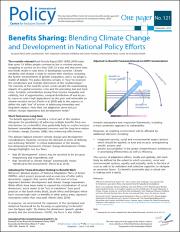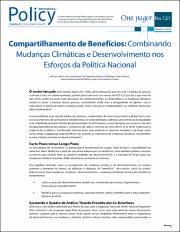Please use this identifier to cite or link to this item:
https://repositorio.ipea.gov.br/handle/11058/15160Files in This Item:
| File | Description | Size | Format | |
|---|---|---|---|---|
| en_IPCOnePager121.pdf | 91.85 kB | Adobe PDF |  View/Open | |
| pt-br_IPCOnePager121.pdf | 118.09 kB | Adobe PDF |  View/Open |
| Title: | Benefits Sharing: Blending Climate Change and Development in National Policy Efforts |
| Other Titles: | Compartilhamento de Benefícios: Combinando Mudanças Climáticas e Desenvolvimento nos Esforços da Política Nacional |
| Authors: | Perch, Leisa |
| Abstract: | The recently released Rural Poverty Report 2011 (IFAD, 2010) notes that some 1.4 billion people continue to live in extreme poverty, struggling to survive on less than US$1.25 a day and that more than two-thirds reside in rural areas of developing countries. That climate variability and change is likely to worsen their situation, including the further entrenchment of gender inequalities, is no longer a matter of debate. The policy dilemma remains in “how” to reconcile the complexities and multiple dimensions of this “problematique”. The intensity of the need for action comes amidst the reverberating impacts of a global economic crisis and the preceding fuel and food crises. Systemic vulnerabilities arising from income inequality and volatility, lack of opportunities, unequal distribution of and access to resources and a high dependence by the poor and vulnerable on climate-sensitive sectors (Perch et al, 2010) add to the urgency to define the right “mix” of actions in addressing immediate and long-term impacts. How then can adaptation serve not just climate change imperatives but development needs? (...) O recém-lançado Rural Poverty Report 2011 (IFAD, 2010) demonstra que cerca de 1,4 bilhão de pessoas continua a viver em extrema pobreza, lutando para sobreviver com menos de USD 1,25 por dia, e que mais de dois terços vivem nas áreas rurais dos países em desenvolvimento. A variabilidade e as mudanças climáticas tendem a piorar a situação destas pessoas, exacerbando ainda mais a desigualdade de gênero—isto é indiscutível. O dilema da política continua sendo “como” conciliar as complexidades e as múltiplas dimensões desta “problemática”. (…) |
| metadata.dc.rights.holder: | International Policy Centre for Inclusive Growth United Nations Development Programme |
| metadata.dc.rights.license: | O texto e dados desta publicação podem ser reproduzidos desde que as fontes sejam citadas. Reproduções com fins comerciais são proibidas. |
| metadata.dc.type: | One Pager |
| Appears in Collections: | Publicações do IPC-IG |
Items in DSpace are protected by copyright, with all rights reserved, unless otherwise indicated.

